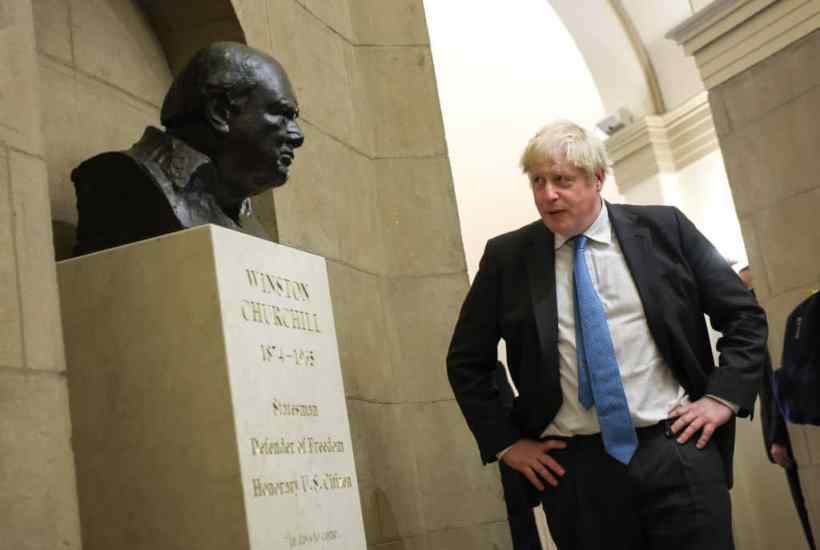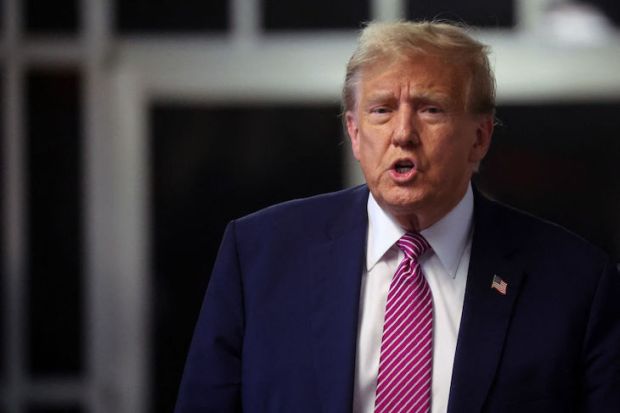On his way up the greasy pole Boris Johnson was keen to claim an affinity with Winston Churchill. Clearly, associating himself with the man voted the Greatest Briton in 2002 was a clever if crude ruse, on par with a B-list actor standing next to Tom Cruise in the hope some of his magic might rub off. It certainly would not have escaped Johnson’s notice that Churchill was fondly remembered, especially by the Conservative party’s mostly aged members who ultimately determine the fate of candidates for the leadership.
In 2014 Johnson went so far as to write a biography of Britain’s wartime premier. Most readers will have come away from the book with the impression that Johnson wanted them to think of him as Churchill reborn. As the authors of The Churchill Myths noted, this aspirational affinity was to some extent genuine: Boris had persuaded himself that the Winston about whom he wrote really did share key aspects of his own character. To him they were both populist risk takers, untrusted by the stuffed shirts of the Establishment but enjoying a unique resonance with ordinary Britons. Indeed, according to Johnson, Churchill was ultimately a leader defined not by reason but by his emotions.
With the 2016 Brexit referendum,as leavers looked for earlier instances of ‘Britain standing alone’, Johnson’s public appropriation of the leader who doggedly refused to sue for peace with Hitler when all looked lost, became even more useful. And when, as Prime Minister, Johnson sought to rescue the country from what looked like a permanent Brexit stand-off, his decision to prorogue parliament was even described by the popular historian Andrew Roberts as his ‘Churchill moment’.
Johnson’s subsequent 2019 general election pledge to ‘Get Brexit Done’ meant that, like his hero, he would save Britainfrom crisis, uniting the classes, north and south, in the process – something Churchill was also reputed to have done. Indeed, with an 80-seat majority, and promising to ‘level up’ the poor with the rich, Johnson looked on the verge of accomplishing in peacetime that which Churchill had never been able to do.
It must therefore have been piquant for Johnson to realise – and to see his snarkier critics point out – that his tenure as Prime Minister lasted only a few days longer than that of Neville Chamberlain, Churchill’s appeasing nemesis and the man he replaced in the summer of 1940. But however self-serving, self-deceiving and superficial Johnson’s appropriation of Churchill was, there are a few real and significant similarities, ones which those Conservative candidates wishing to succeed the current Prime Minister might keep in mind.
Firstly, both men were changeable political characters. They possessed the ability to shapeshift according to the times. Churchill famously ‘ratted and re-ratted’, crossing the floor of the Commons from the Conservatives to the Liberals and back again. As a Liberal Churchill supported the creation of what would become the welfare state before 1914 but in the 1920s was the most reactionary member of the Conservative leadership.
Johnson never went that far; but having won the mayoralty twice in the Labour city of London as a liberal Conservative he subsequently appealed to culturally conservative working-class voters in the North. Flipping from supporting immigration as an economic good as Mayor, as Prime Minister he introduced a controversial scheme to repatriate all refugees to Rwanda. What they fundamentally believed – what was ‘Churchillism’ or ‘Johnsonism’ – was never clear, and perhaps they did not know themselves. But whatever it was, at the time they could communicate it with unparalleled gusto.
Secondly, when in the midst of a national crisis, they did what was necessary: both raised taxes to what many in their own party considered punitive levels and massively advanced the boundaries of the state. Neither did this with anything other than great regret and each hoped such ‘crisis socialism’ was temporary. If they helped save the country from disaster, neither found the nation grateful, and certainly Churchill unknowingly laid the foundations for three decades of a social democratic consensus. It is of course too early to know what the consequences Johnson’s response to Covid and the Ukraine invasion will be for Britain.
In the end, however, there is one huge difference that distinguishes the two. Johnson wrote in his 2014 biography that Churchill was ‘a resounding rebuttal to all Marxist historians who think history is the story of vast impersonal economic forces’ because he instead proved in 1940 that ‘one man can make all the difference’. Despite what Johnson wrote, few historians – even Marxists – would dispute the important and singular role Churchill played in dragging Britain back from the brink after the fall of France. Churchill took his moment in history and rose to its challenge.
It is however unlikely that many historians of the future will see Johnson in the same light. In all likelihood he will be viewed as someone who, when history called, shut the door and partied on regardless. Unlike Churchill, Johnson fluffed his date with destiny.
Got something to add? Join the discussion and comment below.
Get 10 issues for just $10
Subscribe to The Spectator Australia today for the next 10 magazine issues, plus full online access, for just $10.




















Comments
Don't miss out
Join the conversation with other Spectator Australia readers. Subscribe to leave a comment.
SUBSCRIBEAlready a subscriber? Log in